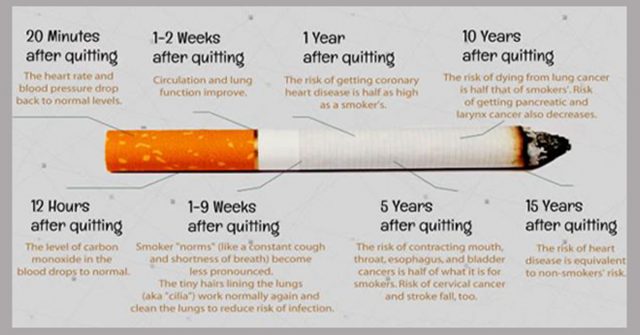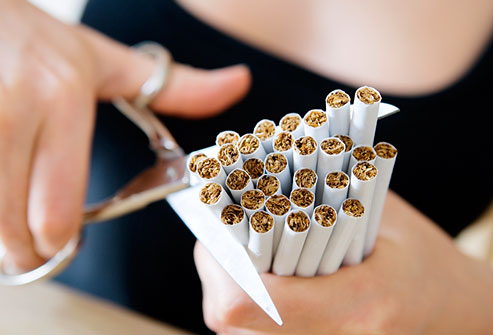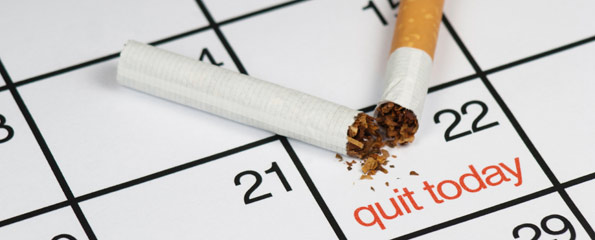It goes without saying that giving up smoking is hard, and if you’ve been smoking for a while, you might wonder if quitting’s even worth it. Maybe the cravings and nicotine withdrawal just turn you off to the whole idea. We can wonder, “The damage is done, so does it really make any difference?”
But the answer is; Absolutely it makes a difference.
Your body has an incredible ability to heal and regenerate itself, and it happens faster than we think; less than 30 minutes after you put out that last cigarette. It’s important to remember that you’re more likely to succeed if you have a previous plan in place to help you handle the cravings that come, especially in the first few weeks.
Here Is What Happens To Your Body When You Quit Smoking:
20 Minutes
Within a shorter amount of time than it takes most people to shower, your body’s already getting better. After 20 minutes, your pulse and blood pressure start to drop back to normal. And your hands and feet warm up to their usual temperature.
8 Hours
After a third of the day has passed, you have half the amount of nicotine and carbon monoxide in your blood. Carbon monoxide is a harmful chemical in cigarettes, and it crowds out the much needed oxygen in your blood. That leads to problems from your muscles to your brain because they aren’t receiving the amount of oxygen that they need.
But as the chemical’s levels drop, your oxygen gets back to normal.
It’s likely at this point that you already feel some early cravings and doubts coming on. This is normal, to be expected, and to be planned for. Cravings usually last just 5-10 minutes, and knowing this gives you a powerful way to succeed. If you can simply find several ways to distract yourself, to not listen to the thoughts of your cravings until the feeling subsides, then you’ve found a way to seriously beat your habit of smoking.
Try calling a friend for support, reading an article on your favorite topic, making a craving playlist, chewing gum, spending 10 minutes doing a random act of kindness, or even sipping water. Committing to Doing whatever it takes is the surest way to succeed.
12 Hours
Halfway through your first day, your carbon monoxide level is back to normal. And your heart is secretly and honestly thanking you. Now it doesn’t have to pump so hard to try to get normal levels of enough oxygen to your body.
24 Hours
If you smoke a pack a day, you’re twice as likely to have a heart attack as a nonsmoker. But go one full day without a cigarette, and you’ve lowered your chances. That’s huge.
48 Hours
After two days, treat yourself to something delicious and reward yourself for a good job when starting. By this point, your senses of taste and smell get sharper as your nerve endings start to heal.
Your body’s also busy with a lot of cleanup. Your lungs kick out mucus and other gunk left from cigarettes. And congratulations, you don’t have any more nicotine in your body.
This is also about the time when the toughest withdrawal symptoms show up. You might feel anxious, dizzy, hungry, or tired. You might get headaches or feel bored or depressed. It’s normal, but it’s also makes it a lot harder to keep from lighting up. It’s important to remember that your body is having those reactions because of the cigarettes, not because it needs them. Non-smokers do not naturally crave nicotine, so assure yourself that the only way to truly satisfy this craving is to quit smoking entirely.
Stick to your plan. You can do it! Stay in smoke-free zones and keep any and all temptation away as much as possible. Lean on your support network, whether it’s friends or family who are supporting you, an app, or a free call with a quitting hotline, such as the National Cancer Institute’s quitline (877-44U-QUIT).
If you have asthma, your symptoms may get worse around this time. That can be confusing, but it’s part of the process and won’t last much longer. You’ll likely see improvement by day 3. You can talk to your doctor about how to keep your symptoms in check.
3 Days
By the end of day 3, you breathe easier and have more energy. Your lungs start to recover and will keep getting better; just keep going.
2 Weeks – 3 Months
During this time, your body is returning to optimal health and you’re potentially and honestly adding wonderful years to your lifes. You can do more because your lungs are stronger and clearer, and your blood flow has improved. You can exercise without getting as winded. And your risk of a heart attack goes down even more.
You’ve also made it through the hardest part of withdrawal, and your ability to solidly quit is getting stronger and stronger.
Even at this point, you’ll probably still get cravings. This is normal and should be expected and planned for. Everyone has different triggers for wanting to smoke. It’s not always possible to stop all of them, but you can stick to your plan and have distracting ideas ready to go at a moment’s notice. Ask for help if you need it. Think about the money you’re saving. Or try 10 deep breaths of fresh and clean air, deep and slow.
3-9 Months
At this point, you can take deeper, clearer breaths. Instead of a smoker’s hacking cough, coughs usually happen in a helpful way that helps to clear things out. This helps you get fewer colds and other illnesses; something by now you’re probably very, very grateful for.
You’ll also have more energy.
1 Year
At the end of year 1, make sure your reward yourself with something nice. You’ve reached a milestone of personal achievement in your life, and now more than ever do you deserve to be showered with praise and acknowledged for how well you’ve done. Your risk of heart disease is now half of what it was a year ago.
5 Years
Your chances of a stroke and cervical cancer are now the same as a nonsmoker. Compared to when you first quit smoking, you’re half as likely to get cancer of the mouth, throat, esophagus, or bladder.
10 Years
Compared to someone who still smokes, you’re now half as likely to die from lung cancer. And the chances you’ll get cancer of the larynx (voice box) and pancreas both drop.
15 Years
Finally, after 15 years of not smoking, the chances that you’ll get heart disease are the same as if you had never smoked. Your body has done a ton of recovering and healing, and the hard work you put in, in the beginning, has paid off.
When you first start out trying to quit, it seems like a painful and long road, but these are just the feelings associated with smoking, and as time goes on after you’ve quit, they are replaced with health and the resulting happiness. At 15 years, the headaches and discomfort of those first few weeks are a hazy memory. They can seem unbearable at the time, but you can get through it. The rewards are very real and clear.
Have you or someone you know quit smoking?
What is something that helped you?
Let us know in the comments.
You Can Do It and You Are Loved.
https://www.instagram.com/p/Bh69bt7hEN5/?taken-by=understanding_compassion




















